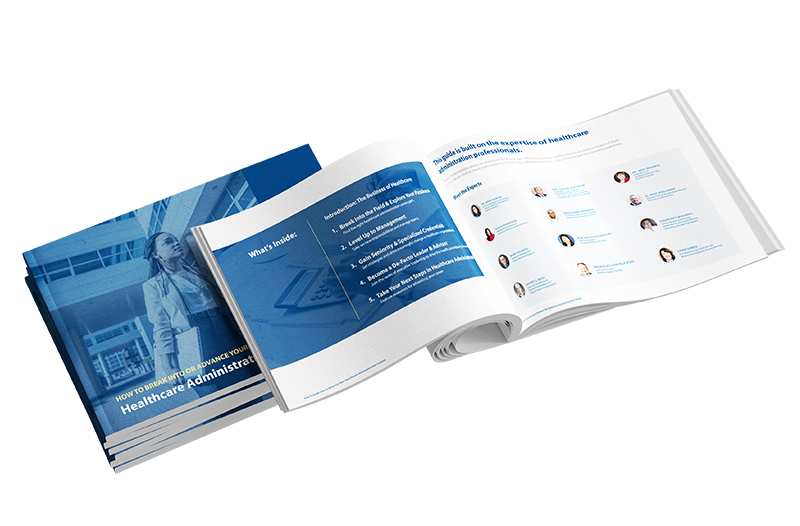Request Information
We're Sorry
There was an unexpected error with the form (your web browser was unable to retrieve some required data from our servers). This kind of error may occur if you have temporarily lost your internet connection. If you're able to verify that your internet connection is stable and the error persists, the Franklin University Help Desk is available to assist you at helpdesk@franklin.edu, 614.947.6682 (local), or 1.866.435.7006 (toll free).
Just a moment while we process your submission.

Can You Get into Healthcare Administration with No Experience?
Healthcare administration is an essential part of the healthcare industry. It plays a crucial role in managing the operations, staffing, finances and strategic planning of hospitals, clinics and other medical facilities that are responsible for overseeing patient care.
If you're considering a career in this field but don't have experience, you may be wondering how to break into healthcare administration. Fortunately, entry-level job opportunities and pathways are available, and with the proper education and approach, you can make your way into this growing industry.
Healthcare Administration and Its Importance
Healthcare administration refers to the leadership, management and organization of healthcare systems and facilities.
Given the growing complexity of healthcare systems and the push for efficiency and patient-centered care, healthcare administrators are more important than ever. This is reflected in stats from Lightcast, which predict that job growth in the United States will climb by 14.6% through 2033. This rapid growth underscores just how vital health administration professionals will continue to be.
Key Responsibilities of a Healthcare Administrator
Healthcare administrators manage all facets of a healthcare facility's operations. Typical job duties include:
- Supervising and managing staff
- Overseeing patient care services
- Managing finances and budgeting
- Ensuring regulatory compliance and risk management
- Developing policies and procedures to improve efficiency and patient outcomes
- Liaising between different departments to coordinate services
Responsibilities may also vary depending on the type of healthcare setting. For example, the expectations in busy metro hospitals may differ from duties given to providers working in nursing homes.
Entry-Level Opportunities in Healthcare Administration
Starting Positions for Aspiring Healthcare Administrators
No experience in the healthcare administration field? It’s okay. Entry-level jobs are still attainable.
These roles often focus on administrative support and customer service, offering insight into the inner workings of healthcare facilities and allowing future admins to build experience over time.
Entry-level positions might include:
- Administrative Assistant. An administrative assistant in a healthcare setting helps coordinate day-to-day operations, scheduling, filing and supporting healthcare management. This role provides a broad overview of healthcare regulations and administrative tasks, making it a great stepping stone for future healthcare administrators. According to Lightcast, the median advertised earnings as of August 2024 for healthcare administrative assistants in the United States is approximately $40,643 annually.
- Medical Registrar. Medical registrars provide expert guidance to organizations on the implementation and optimization of computerized healthcare systems. They are crucial in analyzing clinical data to enhance patient care and streamline healthcare processes. The U.S. Bureau of Labor Statistics (BLS) notes that the advertised median pay for this role in the United States was around $62,990 annually in 2023.
- Medical Receptionist. These professionals handle patient inquiries, process payments and assist with insurance claims. This position allows for direct patient interaction and gives insights into customer service within healthcare. The BLS estimates this role's advertised median pay, as of 2023, to be about $35,840 per year in the United States.
These positions provide foundational knowledge and skills that are essential for future healthcare administrators, especially when paired with the appropriate educational background. They can provide you with the introductory clinical experience you need to be successful in various medical work settings.
Bonus Resource:What Can You Do with a Healthcare Management Degree?
Educational Pathways to Enter the Healthcare Industry
While starting in entry-level positions is one option, pursuing an education can significantly enhance your opportunities in healthcare administration.
According to Dr. Leslie Mathew, chair of the Master of Healthcare Administration and MBA-Healthcare programs at Franklin University, “A degree in healthcare administration provides a strong foundation in the industry’s regulations, management principles and systems, which can be critical for entry-level roles.”
While an associate degree in healthcare administration or a related field can provide foundational health administration skills, a bachelor’s degree provides a deeper understanding of healthcare laws and systems, leadership and regulatory guidelines.
Coursework in these programs typically includes health policy, medical terminology, public health, management principles and healthcare economics.
Advance your career in Healthcare Administration while you advance patient care. Download your free career guide.
.png)
Building Relevant Experience Without a Background in Healthcare
Leveraging Experience from Other Industries
If you don’t have direct healthcare experience, you can still break into the field by emphasizing transferable skills from other industries.
According to Dr. Mathew, “Skills such as project management, leadership, communication, customer service and problem-solving from industries like business, finance, computer science or technology are highly transferable to healthcare administration. Highlighting experience with process improvement, team coordination and data analysis can also demonstrate value to healthcare employers.”
For example, if you’ve worked in project management, you likely have experience in coordinating teams, managing budgets and meeting deadlines. These skills are directly applicable to healthcare administration, where organization and efficiency are key.
.png)
Networking and Mentorship in the Healthcare Industry
Breaking into healthcare administration is often easier when you have a network of professionals who can offer guidance and mentorship.
Dr. Mathew notes that seeking out internships or volunteer opportunities at healthcare facilities can help you build relationships and gain experience with people in the field.
“Internships and volunteer opportunities can provide valuable exposure to the healthcare environment, allowing candidates to build networks, gain practical experience and learn the specific needs of the industry,” he said. “These opportunities often act as stepping stones toward full-time roles in healthcare administration and can help solidify a career path.”
Professional associations, such as the American College of Healthcare Executives (ACHE), can also provide networking opportunities and mentorship. Attending industry conferences or local chapter meetings can help you meet professionals who may offer advice, job leads or mentorship.
The Role of Certifications and Continuing Education
While experience is valuable, certifications can enhance your resume and demonstrate your commitment to the field.
Certifications like the Certified Healthcare Administrative Professional (CHAP) or continuing education courses in healthcare management provide you with up-to-date knowledge of healthcare systems, regulations and best practices. This can be beneficial when applying for entry-level positions, but can also help you achieve more senior roles down the line (such as a certified medical manager or clinic coordinator).
If you already hold an undergraduate degree, you may want to consider pursuing your master’s degree to further support your career trajectory. This may look like an MHA program or an advanced designation of a similar nature.
These types of credentials and educational experiences can make you more competitive in the job market, especially if you lack direct hands-on experience. Many employers look favorably on candidates who invest in professional development, especially in areas like compliance, health informatics, public health or leadership.
Navigating the Job Market as a Healthcare Administrator
Tips for Job Searching Without Direct Experience
When searching for jobs in healthcare administration, it’s important to tailor your resume to highlight your education, relevant skills and experiences.
Be sure to emphasize any degrees or certificates you may hold and any transferable skills, even if they come from another industry. Include any coursework, certifications or volunteer work related to healthcare administration.
Your cover letter should explain your interest in the healthcare field and how your previous experience will benefit the employer. Even without direct experience, focusing on your strengths—like project management, team leadership or customer service—can help you stand out as an ideal candidate.
Additionally, you can utilize healthcare-specific job boards, such as healthcarejobsite.com, to find positions tailored to your experience, interests and skills.
Preparing for Interviews
During interviews for healthcare administrator roles, you’ll likely be asked questions that test your understanding of healthcare and your ability to handle the unique challenges of the role. Be prepared to discuss regulatory requirements, patient satisfaction, soft skills and how you can manage resources effectively.
It’s also important to acknowledge your lack of direct experience while highlighting your transferable skills, real-world experience and eagerness to learn. Employers will appreciate your honesty and the efforts you’ve taken to prepare for a role in healthcare administration.
.png)
Ready to Start Your Healthcare Journey? Connect With Franklin University.
If you're ready to take the next step in your healthcare career, Franklin University's Bachelor's in Healthcare Administration program is designed to give you the knowledge and skills needed to succeed.
With a strong foundation in healthcare management, regulations and systems, you'll be well-prepared for medical administration jobs and career advancement.
Explore our program and take the first step toward a rewarding healthcare career! Learn more or apply today!





